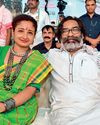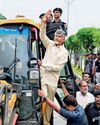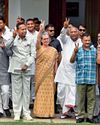Why the judicial system has broken down and how to fix it

Oh, poor litigant, people languishing in jails.” His voice trembled a little. “In the name of development and progress, I beseech you,” he looked at Prime Minister Narendra Modi, “to rise to the occasion and realise that it’s not enough to c-r-i-t-i-c-i-s-e.” The sentence trailed off, pauses between words got longer. Heads jerked up and eyes widened. It was the sound of a man struggling to keep his voice from betraying his feelings. But it wasn’t just any man. The 43rd Chief Justice of India, Tirath Singh Thakur, stood on stage, jaws tight, eyes averted, reaching into his pocket for a handkerchief to mop his eyes. The silence inside Delhi’s Vigyan Bhavan on April 25 was absolute, people exchanged glances in shock and dismay. The prime minister looked on intently from his seat on the stage.
It actually took all of 37 minutes and four seconds for the CJI to force the nation to sit up and pay attention. Exactly the time in which judges around the country conclude 15 hearings and decide seven cases, on average. That’s because judges in the busiest courts spend an average of 2.5 minutes to hear a case and about five minutes to decide one (see following story). Not because our judges are in a hurry. But because they can hardly devote more time to a case, such is the shortfall of judges in the country. As mentioned in the Lok Sabha on March 3, 2016, 44 per cent judges are missing in high courts, 25 per cent in subordinate courts and 19 per cent in the Supreme Court.
FOUR NOBLE TRUTHS
Denne historien er fra May 09, 2016-utgaven av India Today.
Start din 7-dagers gratis prøveperiode på Magzter GOLD for å få tilgang til tusenvis av utvalgte premiumhistorier og 9000+ magasiner og aviser.
Allerede abonnent ? Logg på
Denne historien er fra May 09, 2016-utgaven av India Today.
Start din 7-dagers gratis prøveperiode på Magzter GOLD for å få tilgang til tusenvis av utvalgte premiumhistorier og 9000+ magasiner og aviser.
Allerede abonnent? Logg på

Delhi's Belly
Academic, historian and one of India's most-loved food writers, PUSHPESH PANT'S latest book-From the King's Table to Street Food: A Food History of Delhi-delves deep into the capital's culinary heritage

IT TAKES TWO TO TANGO
Hemant and Kalpana Soren changed Jharkhand's political game, converting near-collapse into an extraordinary comeback

THE MAHA BONDING
At one time, Fadnavis, Shinde and Ajit Pawar were seen as an unwieldy trio with mutually subversive intent. A bumper assembly poll harvest inverts that

THE LION PRINCE
A spectacular assembly election win ended a long political winter for Kashmir and his party, the National Conference. But Omar Abdullah now faces crucial tests—that of meeting great expectations and holding his own with the Centre till J&K gets its statehood back

TRIAL BY FIRE
Formal charges in a US court, an air marked by accusations of bribery and concealment of information, the attendant political backlash, pressure on stock prices, valuation losses. Yet the famed Adani growth appetite and business resilience stays

'Criticism has always been a source of motivation for me'
It’s just day five since he was crowned 2024 FIDE World Chess champion (which he celebrated with a bungee jump), and Gukesh Dommaraju is still learning to adjust to the fanfare.

THE YOUNG GRANDMASTERS
GUKESH DOMMARAJU IS NOW THE YOUNGEST EVER WORLD CHAMPION, BUT THAT IS JUST ICING ON THE CAKE IN INDIA'S CHESS STORY. FOR THE 'GOLDEN GENERATION', 2024 WAS THE YEAR THEY DID IT ALL

SHOOTING QUEEN
Manu Bhaker scripted a classic turnaround at Paris 2024, putting the ghosts of the past behind her through sheer willpower to engrave her own destiny

THE COMEBACK KING
It was in no one's script: Naidu's standing leap from near-oblivion, to a place where he writes the destiny of Andhra—even New Delhi

HALTING THE BJP JUGGERNAUT
A roller-coaster year saw the Opposition coalition rebound with bold moves and policy wins, but internal rifts continue to test its durability